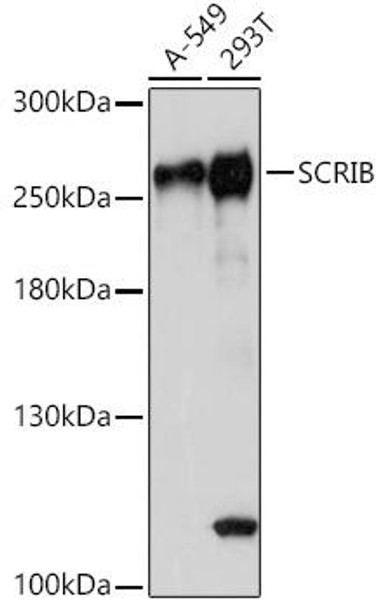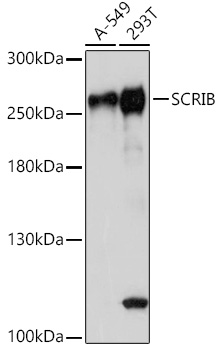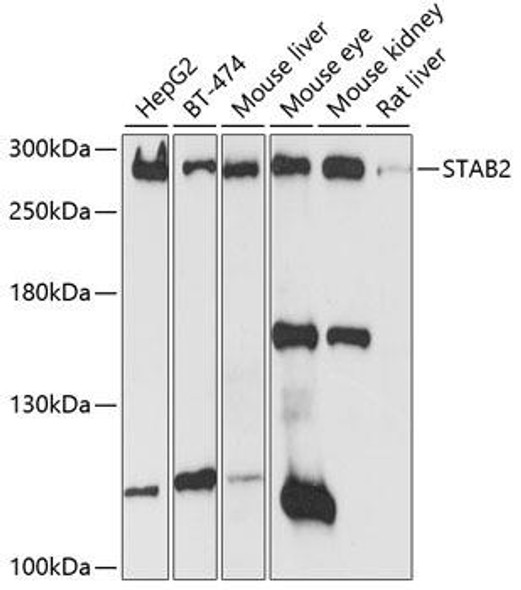Anti-SCRIB Antibody (CAB17450)
- SKU:
- CAB17450
- Product type:
- Antibody
- Reactivity:
- Human
- Mouse
- Host Species:
- Rabbit
- Isotype:
- IgG
- Antibody Type:
- Polyclonal Antibody
- Research Area:
- Developmental Biology
Frequently bought together:
Description
| Antibody Name: | Anti-SCRIB Antibody |
| Antibody SKU: | CAB17450 |
| Antibody Size: | 20uL, 50uL, 100uL |
| Application: | WB IF |
| Reactivity: | Human, Mouse |
| Host Species: | Rabbit |
| Immunogen: | Recombinant protein of human SCRIB. |
| Application: | WB IF |
| Recommended Dilution: | WB 1:500 - 1:2000 IF 1:50 - 1:200 |
| Reactivity: | Human, Mouse |
| Positive Samples: | A-549, 293T |
| Immunogen: | Recombinant protein of human SCRIB. |
| Purification Method: | Affinity purification |
| Storage Buffer: | Store at -20°C. Avoid freeze / thaw cycles. Buffer: PBS with 0.02% sodium azide, 50% glycerol, pH7.3. |
| Isotype: | IgG |
| Sequence: | Email for sequence |
| Gene ID: | 23513 |
| Uniprot: | Q14160 |
| Cellular Location: | |
| Calculated MW: | 175kDa |
| Observed MW: | 260kDa |
| Synonyms: | CRIB1, SCRB1, SCRIB1, Vartul, SCRIB |
| Background: | This gene encodes a protein that was identified as being similar to the Drosophila scribble protein. The mammalian protein is involved in tumor suppression pathways. As a scaffold protein involved in cell polarization processes, this protein binds to many other proteins. The encoded protein binds to papillomavirus E6 protein via its PDZ domain and the C-terminus of E6. Two alternatively spliced transcript variants that encode different protein isoforms have been found for this gene. |
| UniProt Protein Function: | Scribble: may be involved in regulating neuroblast cortical polarity, cell size asymmetry and mitotic spindle asymmetry. A neoplastic tumor suppressor genes in Drosophila melanogaster. May play a role in the suppression of mammalian tumorigenesis. Gene ablation in the mouse causes severe neural tube defects. May be implicated in the etiology of human NTDs. Involved in the regulation of synaptic plasticity and synaptic vesicle dynamics. May be required to sustain synaptic vesicle concentrations at their sites of release. Targeted for ubiquitin-mediated degradation by the HPV E6 oncoprotein. |
| UniProt Protein Details: | Protein type:Cell adhesion; Motility/polarity/chemotaxis Chromosomal Location of Human Ortholog: 8q24.3 Cellular Component: cell junction; cell-cell adherens junction; cytoplasm; intercellular junction; leading edge; nucleoplasm; plasma membrane; postsynaptic membrane; presynaptic membrane Molecular Function:protein binding Biological Process: cell migration; cell proliferation; cell-cell adhesion; establishment of apical/basal cell polarity; negative regulation of mitotic cell cycle; neural tube closure; positive chemotaxis; positive regulation of apoptosis; positive regulation of receptor recycling |
| NCBI Summary: | This gene encodes a protein that was identified as being similar to the Drosophila scribble protein. The mammalian protein is involved in tumor suppression pathways. As a scaffold protein involved in cell polarization processes, this protein binds to many other proteins. The encoded protein binds to papillomavirus E6 protein via its PDZ domain and the C-terminus of E6. Two alternatively spliced transcript variants that encode different protein isoforms have been found for this gene. [provided by RefSeq, Nov 2011] |
| UniProt Code: | Q14160 |
| NCBI GenInfo Identifier: | 261260101 |
| NCBI Gene ID: | 23513 |
| NCBI Accession: | Q14160.4 |
| UniProt Secondary Accession: | Q14160,Q6P496, Q7Z5D1, Q8WWV8, Q96C69, Q96GG1, |
| UniProt Related Accession: | Q14160 |
| Molecular Weight: | 177,694 Da |
| NCBI Full Name: | Protein scribble homolog |
| NCBI Synonym Full Names: | scribbled planar cell polarity protein |
| NCBI Official Symbol: | SCRIB |
| NCBI Official Synonym Symbols: | CRIB1; SCRB1; SCRIB1; Vartul |
| NCBI Protein Information: | protein scribble homolog |
| UniProt Protein Name: | Protein scribble homolog |
| UniProt Synonym Protein Names: | Protein LAP4 |
| Protein Family: | Protein |
| UniProt Gene Name: | SCRIB |
| UniProt Entry Name: | SCRIB_HUMAN |









